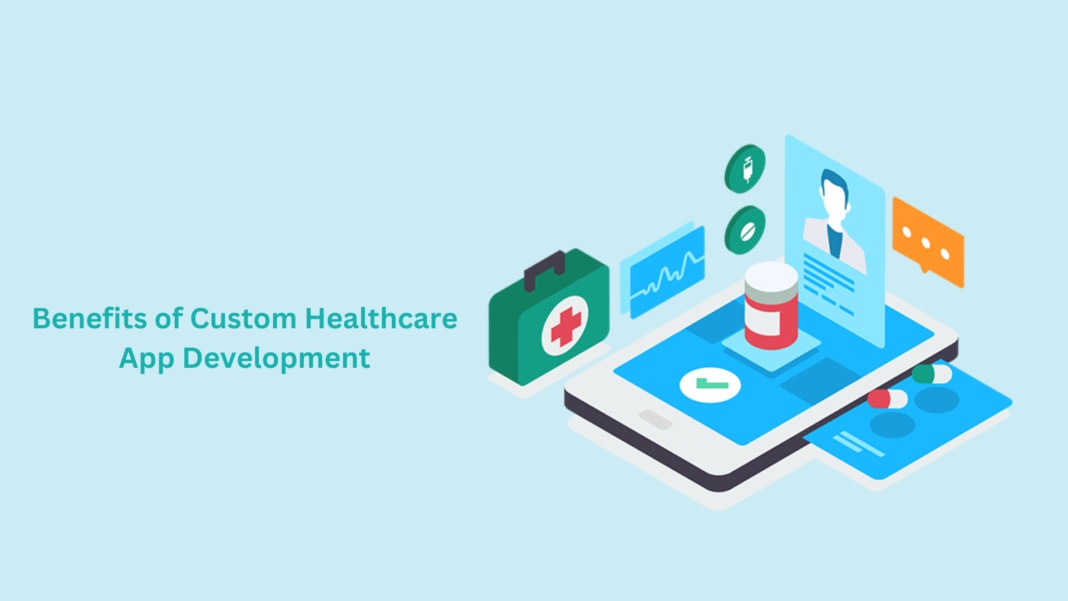Custom healthcare app development refers to the creation of mobile or web applications designed to meet the specific needs of healthcare providers and patients. Unlike generic healthcare apps, custom solutions are built with the unique requirements of healthcare organizations in mind, ensuring the integration of necessary features, compliance with regulations, and scalability for future needs.
With the increasing reliance on technology, the healthcare industry is witnessing a shift towards digital solutions that improve the delivery of medical services. From telemedicine platforms to patient management systems, custom healthcare applications allow healthcare professionals to provide better care while reducing operational inefficiencies. As the demand for personalized care continues to grow, custom healthcare app development has become essential for meeting evolving patient expectations.
Key Benefits of Custom Healthcare App Development
Enhancing Patient Engagement and Satisfaction
A primary benefit of custom healthcare apps is their ability to engage patients effectively. Custom applications are designed to provide personalized experiences, making it easier for patients to track their health, schedule appointments, access medical records, and communicate with healthcare experts. These features foster stronger relationships between patients and providers, leading to improved satisfaction and loyalty.
Improving Healthcare Accessibility and Convenience
Custom healthcare apps make healthcare services more available to patients, regardless of location. With telemedicine features, patients can consult with their doctors remotely, reducing the need for physical visits in some cases. This is valuable in rural or underserved areas where access to healthcare is limited.
Streamlining Administrative and Clinical Processes
From appointment scheduling to billing, custom applications can streamline various administrative and clinical processes within healthcare organizations. It minimizes the time spent on manual tasks and significantly lowers the risk of errors, leading to more efficient and accurate healthcare operations. By automating these processes, healthcare service providers can dedicate more time and resources to delivering high-quality patient care, improving overall efficiency and outcomes.
Personalized Care and Treatment Plans
Leveraging Data for Personalized Patient Care
Custom healthcare apps allow for the collection and analysis of patient data, enabling healthcare providers to create personalized treatment plans. By using data analytics, healthcare doctors can monitor patient progress, identify patterns, and make informed decisions. This results in improved patient outcomes and more efficient healthcare delivery, enhancing the overall quality of care.
Integrating AI and Machine Learning for Predictive Healthcare Analysis
Artificial intelligence (AI) and machine learning (ML) play a significant role in custom healthcare mobile app development. These technologies enable predictive analysis, allowing healthcare providers to forecast patient health outcomes, identify potential health risks, and recommend proactive measures. Custom healthcare mobile apps with AI integration can improve diagnosis accuracy and facilitate personalized treatments.
Improved Communication and Collaboration
Facilitating Doctor-Patient Communication
Effective communication between doctors and patients is essential for delivering quality care, fostering trust, and ensuring accurate diagnosis and treatment. Custom healthcare apps offer features like instant messaging, video calls, and appointment reminders, which improve communication. Patients can easily reach out to their healthcare service providers for consultations, follow-ups, or advice, ensuring a more responsive healthcare experience.
Enabling Seamless Collaboration Among Healthcare Teams
Custom mobile apps also improve collaboration among healthcare professionals. Features like secure document sharing, real-time data access, and integrated communication tools allow doctors, nurses, and other medical staff to work together efficiently. This ensures that patients receive coordinated and well-rounded care.
Data Security and Compliance
Ensuring HIPAA and Other Regulatory Compliance
One of the major concerns in healthcare app development is data security. Custom healthcare apps are designed to ensure compliance with healthcare regulations, including the Health Insurance Portability and Accountability Act (HIPAA), safeguarding patient data and privacy. By ensuring that sensitive patient information is encrypted and securely stored, custom healthcare apps provide peace of mind to both patients and healthcare providers.
Securing Patient Information with Advanced Technologies
Custom healthcare apps utilize advanced security measures like two-factor authentication, data encryption, and secure cloud storage to safeguard patient data, ensuring robust protection against unauthorized access and breaches. These measures help safeguard against cyberattacks and data breaches, which is important in maintaining trust and ensuring regulatory compliance.
Cost-Effectiveness and Operational Efficiency
Reducing Operational Costs for Healthcare Providers
By automating processes and reducing the need for manual tasks, custom healthcare apps can significantly minimize operational costs for healthcare service providers. Features such as automated billing, patient management, and data analytics help organizations save both money and time.
Boosting Efficiency with Automation and Real-Time Data Access
Custom healthcare mobile apps enable healthcare providers to access real-time patient data, making it easier to make informed decisions. Automation of routine tasks such as appointment scheduling, medical record keeping, and follow-up reminders enhances overall efficiency and reduces the risk of human error.
Integrating Wearable Devices and IoT
Real-Time Monitoring with IoT-Enabled Devices
Wearable devices and the Internet of Things (IoT) are transforming healthcare by providing real-time monitoring of patients’ health conditions. Custom healthcare applications can integrate with wearable devices to track vital signs, physical activity, and other health metrics. This data can be accessed remotely by healthcare providers, enabling proactive care and timely interventions.
Improving Patient Outcomes with Remote Monitoring
Remote monitoring via wearable devices allows healthcare providers to keep a close eye on patients’ health without requiring them to be physically present. This is especially beneficial for patients with chronic conditions, as doctors can monitor their progress and adjust treatments as needed.
Scalability and Future-Proofing Your Healthcare App
Preparing for Future Technological Advancements
Custom healthcare apps are designed with scalability in mind, ensuring that they can evolve as technology advances. Whether it’s integrating new features, expanding services, or updating security protocols, custom apps can be easily adapted to meet future healthcare needs.
How Custom Solutions Can Evolve with Healthcare Needs
The healthcare industry is constantly evolving, and custom healthcare apps are built to adapt to changing trends and regulations. With the flexibility to incorporate new technologies like AI, blockchain, and 5G, these apps remain relevant and continue to provide value over time.
Choosing the Right Healthcare App Development Company
Key Factors to Consider in Selecting a Development Partner
Selecting the right healthcare mobile app development company is essential for the success of your app, as it ensures the delivery of a secure, user-friendly, and compliant solution tailored to your specific needs. Consider factors such as the company’s experience in healthcare app development, their understanding of regulatory requirements, and their ability to provide scalable and innovative solutions.
Why Customization is the Key to Success in Healthcare Apps
Customization is the key to success in healthcare apps because it allows healthcare organizations to address their unique challenges. Generic solutions often fall short of meeting specific needs, while custom apps provide tailored features, ensuring a better fit for the organization and improved patient care.
Final Words
As technology reshapes the healthcare landscape, custom healthcare app development will improve patient outcomes, operational efficiency, and overall healthcare delivery. By leveraging the latest advancements in AI, IoT, and data security, custom apps are paving the way for a more personalized and accessible healthcare experience.
Investing in a custom healthcare app is a smart decision for healthcare providers looking to enhance patient care, streamline processes, and stay competitive in a rapidly evolving industry. With the right app development partner, a custom healthcare app can deliver long-lasting benefits, ensuring a healthier future for both patients and healthcare organizations.
Author/Bio
Saddam is the Chief Technology Officer (CTO) at Comfygen Pvt Ltd., a leading custom healthcare app development company. With a deep expertise in advanced technologies and a passion for innovation, Saddam spearheads the development of cutting-edge, secure, and user-centric healthcare solutions. His visionary leadership ensures that Comfygen’s applications meet the highest standards of quality, compliance, and efficiency. Under his guidance, the company excels in creating customized solutions that enhance patient care, streamline healthcare processes, and drive industry advancements. Saddam’s commitment to excellence and technological proficiency positions Comfygen as a top player in the healthcare app development sector.








